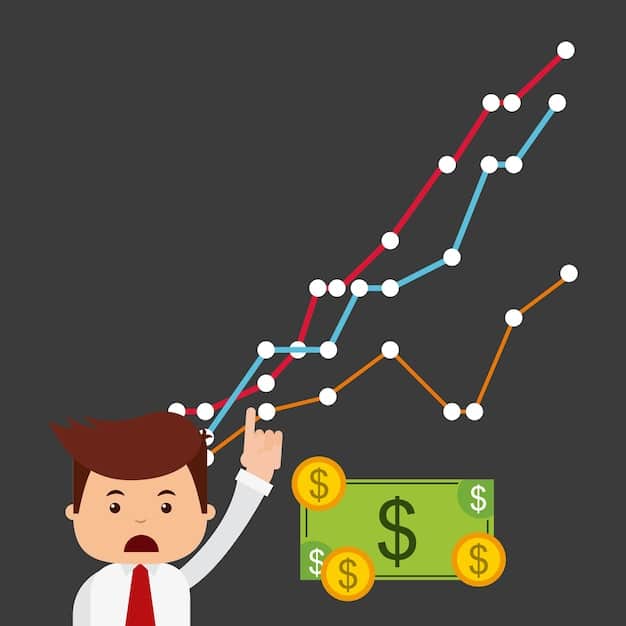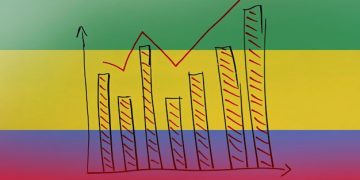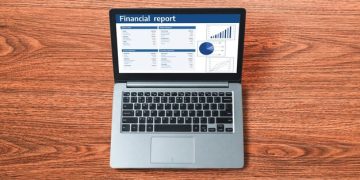How 3.2% Inflation in 2025 Will Reshape Your Budget

How Will the Projected 3.2% Inflation Rate in 2025 Impact Your Personal Budget? It will likely mean higher prices for goods and services, potentially affecting your spending habits, savings goals, and investment strategies, requiring careful financial planning and adjustments.
Navigating the financial landscape can feel like sailing uncharted waters, especially when economic forecasts like the projected 3.2% inflation rate in 2025 loom on the horizon. Understanding how will the projected 3.2% inflation rate in 2025 impact your personal budget? is crucial for making informed financial decisions and ensuring long-term financial stability.
Understanding the Basics of Inflation
Inflation, at its core, represents the rate at which the general level of prices for goods and services is rising, and subsequently, purchasing power is falling. While a small amount of inflation is generally accepted as a sign of a healthy, growing economy, too much can erode the value of your money and make it harder to afford everyday expenses.
To effectively prepare for 2025’s projected inflation rate, it’s important to understand how inflation is measured and what factors can influence it.
How is Inflation Measured?
Inflation is typically measured using the Consumer Price Index (CPI) and the Producer Price Index (PPI). CPI tracks the average change over time in the prices paid by urban consumers for a basket of consumer goods and services. PPI, on the other hand, measures the average change in selling prices received by domestic producers. Both indices provide valuable insights into the overall health of the economy and the potential impact on consumer spending.
Factors That Influence Inflation
Several factors can influence inflation, including:
- Demand-Pull Inflation: Occurs when there is an increase in demand for goods and services that outpaces the available supply.
- Cost-Push Inflation: Arises when the costs of production, such as wages and raw materials, increase, leading businesses to raise prices.
- Monetary Policy: Actions taken by central banks, such as adjusting interest rates or the money supply, can significantly impact inflation levels.
Understanding these factors will help you anticipate and better prepare for the financial implications of inflation. Inflation erodes the purchasing power of money, meaning your dollar in 2025 might not stretch as far as it does today.
The Projected 3.2% Inflation Rate: What Does It Mean?
The projected 3.2% inflation rate for 2025 offers a crucial benchmark for understanding the potential challenges and opportunities ahead. This rate suggests a moderate increase in the cost of living, prompting individuals and families to re-evaluate their financial strategies.
But what exactly does a 3.2% inflation rate mean for your day-to-day expenses and long-term financial goals?
Impact on Everyday Expenses
A 3.2% inflation rate will likely translate to higher prices for groceries, transportation, healthcare, and other essential goods and services. For example, if your monthly grocery bill is currently $400, a 3.2% increase would raise it by $12.80, totaling $412.80. While this may seem small, these incremental increases across multiple categories can quickly add up, straining your budget. This can make it harder to make ends meet, especially for those on fixed incomes or with limited financial resources.
Impact on Savings and Investments
Inflation can also affect the real return on your savings and investments. If your savings account earns an interest rate lower than the inflation rate, your money is effectively losing value over time. Similarly, the returns on your investments must outpace inflation to maintain or increase their real value. Therefore, it is very important to review your investment strategy to account for inflation. Consider inflation-protected securities or assets that tend to perform well during inflationary periods.

The projected 3.2% inflation rate serves as an important signal to reassess your budget, savings, and investment plans to safeguard your financial well-being.
Assessing Your Current Financial Situation
Before you can effectively mitigate the impact of inflation, it’s important to take stock of your current financial situation. This involves evaluating your income, expenses, assets, and liabilities to identify areas where you may be vulnerable to rising prices.
A comprehensive financial assessment is the cornerstone of a resilient financial strategy. It enables you to create targeted strategies to counteract inflation.
Creating a Detailed Budget
Start by creating a detailed budget that outlines your monthly income and expenses. Track your spending habits for a few weeks or months to get a clear picture of where your money is going. Categorize your expenses into essential (e.g., housing, food, transportation) and discretionary (e.g., entertainment, dining out) to identify areas where you can potentially cut back.
Evaluating Your Debt
High levels of debt can make you more vulnerable to inflation, as rising interest rates can increase your monthly payments. Prioritize paying down high-interest debt, such as credit card balances, to free up cash flow and reduce your financial burden. Consider debt consolidation or balance transfers to lower your interest rates and simplify your repayment plan.
Reviewing Your Assets
Assess the value of your assets, including savings, investments, and real estate. Determine how well your assets are positioned to withstand inflation. Are your investments diversified across different asset classes? Are you earning a competitive return on your savings? Make adjustments as needed to optimize your portfolio for inflation protection. Be sure to include assets in your calculation, such as funds in savings accounts, investment portfolios and real estate.
By taking a thorough look at your finances, you can identify your strengths and weaknesses and develop a plan to navigate the challenges posed by inflation.
Strategies to Protect Your Budget Against Inflation
Now that you understand the potential impact of inflation and have assessed your financial situation, it’s time to explore strategies to protect your budget and maintain your purchasing power.
There are multiple measures you can take to mitigate the negative effects of inflation. These include adjusting your spending habits and looking to earn more income.
Negotiate Bills and Cut Expenses
Take steps to reduce your monthly expenses by negotiating bills, cutting discretionary spending, and finding ways to save money on essential items. Call your service providers to negotiate lower rates for your cable, internet, and insurance. Look for discounts and coupons when shopping for groceries and other household goods. Consider downsizing your home or car to reduce your housing and transportation costs.
Invest in Inflation-Protected Securities
Consider investing in Treasury Inflation-Protected Securities (TIPS), which are designed to protect investors from inflation. TIPS adjust their principal value based on changes in the CPI, ensuring that your returns keep pace with rising prices. You can purchase TIPS directly from the U.S. Treasury or through a brokerage account. Other assets perform well during periods of higher inflation, like real estate and certain commodities.
Increase Your Income
Explore ways to increase your income, such as taking on a side hustle, freelancing, or pursuing a promotion at work. Even a small increase in income can help offset the impact of inflation on your budget. You can also consider selling unused items, renting out a spare room, or participating in online surveys to earn extra money. Even a few hundred dollars per month could provide a welcome boost to your bottom line.
- Negotiate a raise at work.
- Pursue additional education, certifications or job training in your field to make yourself more valuable to the organization.
- Start a side hustle using skills you already have.
These strategies can help you safeguard your budget and maintain your financial stability in an inflationary environment.
Long-Term Financial Planning in an Inflationary Environment
While short-term strategies can help you weather the immediate effects of inflation, long-term financial planning is essential for achieving your financial goals. This involves setting clear objectives, developing a comprehensive plan, and regularly reviewing and adjusting your approach.
Consider how inflation could impact your retirement savings, investment portfolio, and estate planning. A well-crafted plan is the first step towards financial security.
Adjust Your Retirement Savings Goals
Factor inflation into your retirement savings projections to ensure that you have enough money to maintain your desired lifestyle. Consider increasing your contributions to your retirement accounts, such as 401(k)s and IRAs, to account for rising prices. Work with a financial advisor to develop a retirement plan that incorporates inflation assumptions and risk tolerance.
Adjust Your Investment Portfolio
Diversify your investment portfolio across different asset classes, such as stocks, bonds, real estate, and commodities, to reduce risk and enhance returns. Consider rebalancing your portfolio periodically to maintain your desired asset allocation. Be sure to also consider inflation protected securities. Consult with a financial advisor to create an investment strategy that aligns with your financial goals and risk tolerance.

Estate Planning Considerations
Review your estate plan to ensure that your assets are protected and distributed according to your wishes. Consider updating your will, trusts, and other estate planning documents to reflect changes in your financial situation. Consult with an estate planning attorney to address any specific concerns or questions. Careful planning will ensure your loved ones are provided for if anything should happen to you.
With careful planning and proactive adjustments, you can navigate the challenges of inflation and achieve your long-term financial goals. A financial advisor can help you plan for the future.
Staying Informed and Seeking Professional Advice
In a rapidly changing economic environment, staying informed and seeking professional advice is more important than ever. Keep abreast of the latest economic news, financial trends, and investment strategies to make informed decisions about your money.
Engaging experts is key to optimizing your financial strategy. They will provide valuable insight and guidance.
Follow Economic News and Trends
Stay informed about economic news and trends by reading reputable financial publications, following economic blogs, and listening to financial podcasts. Pay attention to inflation reports, interest rate announcements, and other economic indicators that can impact your financial decisions. Sign up for newsletters and alerts from financial institutions and government agencies to stay updated on important developments.
Consult with a Financial Advisor
Consider working with a qualified financial advisor who can provide personalized advice based on your unique financial situation and goals. A financial advisor can help you develop a comprehensive financial plan, manage your investments, and navigate the complexities of inflation. Look for advisors who are certified and have a proven track record of success. The right financial advisor can guide you towards financial security.
Attend Workshops and Seminars
Attend financial workshops and seminars to learn more about personal finance, investing, and retirement planning. These events can provide valuable insights and practical tips for managing your money effectively. Look for workshops offered by reputable organizations, such as community centers, colleges, and financial institutions. Knowledge is the first step towards financial power.
By staying informed and seeking professional guidance, you can make informed decisions and protect your financial well-being in the face of inflation.
| Key Point | Brief Description |
|---|---|
| 💰 Budget Assessment | Review income, expenses, and debt to identify vulnerabilities. |
| 💡 Expense Reduction | Negotiate bills, cut discretionary spending, and use coupons. |
| 📈 Investment Strategies | Consider TIPS and diversify your portfolio. |
| 💼 Income Increase | Explore side hustles or seek a promotion for extra income. |
Frequently Asked Questions (FAQ)
▼
Inflation is the rate at which the general level of prices for goods and services is rising, eroding purchasing power. It’s primarily measured using the Consumer Price Index (CPI) and the Producer Price Index (PPI).
▼
A 3.2% inflation rate means you’ll likely pay more for everyday items like groceries, gas, and utilities. Budget adjustments may be needed to maintain your current lifestyle.
▼
Treasury Inflation-Protected Securities (TIPS) are bonds that adjust their principal based on changes in the CPI, protecting your investment’s real value from inflation.
▼
Diversifying your portfolio with assets like real estate, commodities, and stocks that tend to perform well during inflationary periods can provide additional protection.
▼
Seeking advice from a financial advisor is beneficial when you need personalized guidance, especially for making complex financial decisions or when developing a comprehensive financial plan.
Conclusion
Understanding how will the projected 3.2% inflation rate in 2025 impact your personal budget? is critical for financial preparedness. By assessing your financial situation, implementing protective strategies, and seeking professional advice, you can navigate the inflationary landscape and achieve your long-term financial goals with confidence. Stay informed, stay proactive, and secure your financial future.





